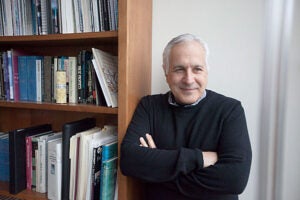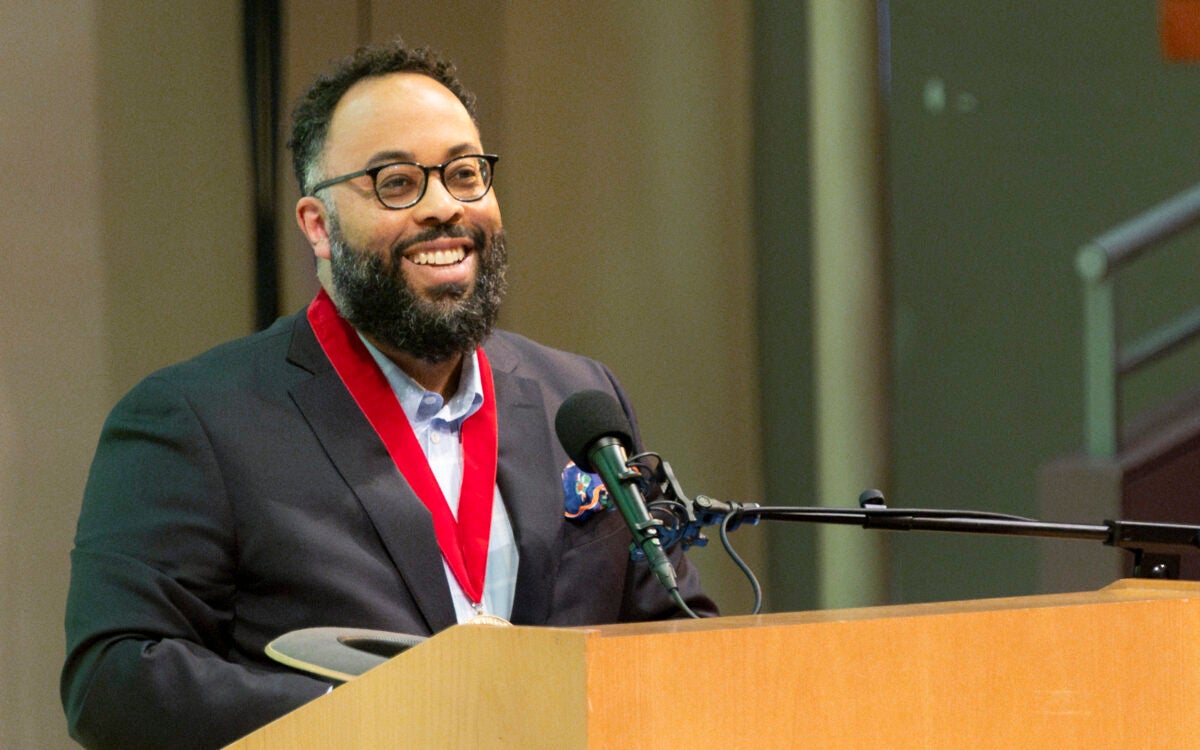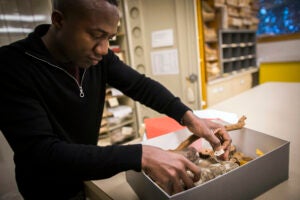Tag: Peter Reuell
-
Nation & World
Two atoms combined in dipolar molecule
Harvard Assistant Professor of Chemistry and Chemical Biology Kang-Kuen Ni and colleagues have combined two atoms for the first time into what researchers call a dipolar molecule.

-
Nation & World
FAS stars honored with Dean’s Distinction Awards
Four teams and 61 employees from across FAS were honored at the annual Dean’s Distinction Awards ceremony.
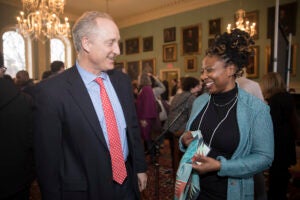
-
Nation & World
A role for cyanide in recipe for life
New Harvard findings show that a mixture of cyanide and copper, when irradiated with UV light, could have helped form the building blocks of life on early Earth.
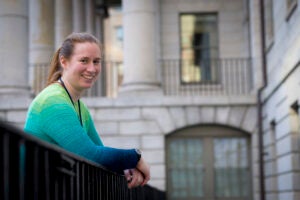
-
Nation & World
Learning to find ‘quiet’ earthquakes
Assistant Professor of Earth and Planetary Sciences Marine Denolle is one of several co-authors of a study that used computer-learning algorithms to identify small earthquakes buried in seismic noise.

-
Nation & World
A new view of the moon
Harvard grad student Simon Lock is the lead author of a study that challenges conventional wisdom on how the moon formed.

-
Nation & World
For this flower, it’s ready, set, launch
Harvard researchers used high-speed video to not only quantify how fast the filaments in mountain laurel flowers move, but how they target likely pollinators.

-
Nation & World
James McCarthy recognized for climate change insights
Tyler Prize winner James McCarthy, a professor of biological oceanography and Alexander Agassiz Professor of Biological Oceanography in the Museum of Comparative Zoology, remains optimistic that climate change is a solvable problem.
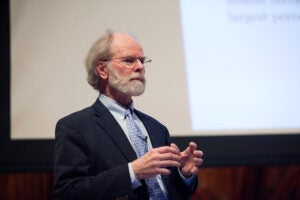
-
Nation & World
Songs in the key of humanity
A new Harvard study suggests that people around the globe can identify lullabies, dancing songs, and healing songs — regardless of the songs’ cultural origin — after hearing just a 14-second clip.
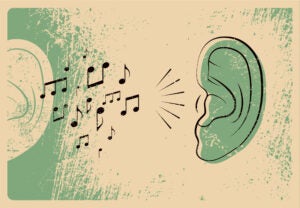
-
Nation & World
Picture-perfect approach to science
After creating a 3-D language called quon, which could be used to understand concepts related to quantum information theory, Harvard mathematicians now say the language offers tantalizing hints that it could offer insight into a host of other areas in mathematics, from algebra to Fourier analysis, and in theoretical physics from statistical physics to string…
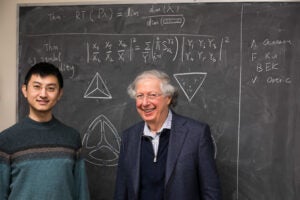
-
Nation & World
For answers on coral conservation, she followed the fish
A new study suggests that efforts to restore coral reefs have a positive impact on fish populations, both short- and long-term.

-
Nation & World
As climate changes, so will wine grapes
Though vineyards might be able to counteract some effects of climate change by planting lesser-known grape varieties, scientists and vintners need a better understanding of the wide diversity of grapes and their adaptions.

-
Nation & World
Discerning bird
To look at him, Griffin doesn’t seem like he’d be smarter than your typical 4-year-old — he’s a bird, after all. But the African grey parrot can easily outperform young children on certain tests, including one that measures understanding of volume.

-
Nation & World
Study identifies hundreds of genetic ‘switches’ that affect height
Researchers discovered hundreds of genetic “switches” that influence height, then performed tests that demonstrated how one such switch altered the function of a key gene involved in height difference.
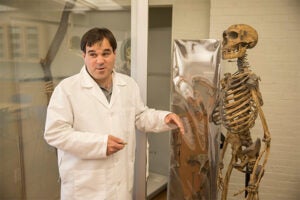
-
Nation & World
Researchers create quantum calculator
Researchers have developed a special type of quantum computer, known as a quantum simulator, that is programmed by capturing super-cooled rubidium atoms with lasers and arranging them in a specific order, then allowing quantum mechanics to do the necessary calculations.
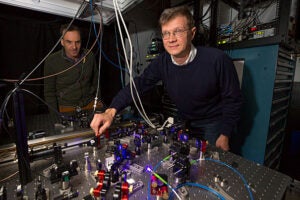
-
Nation & World
Small media, big payback
Researchers found that if just three outlets write about a particular major national policy topic, discussion of that topic across social media rises by more than 62 percent.

-
Nation & World
A step forward in DNA base editing
Scientists at Harvard University and the Broad Institute have developed a new class of DNA base editor that can repair the type of mutations that account for half of human disease-associated point mutations. These single-letter mutations are associated with disorders ranging from genetic blindness to sickle-cell anemia to metabolic disorders to cystic fibrosis.
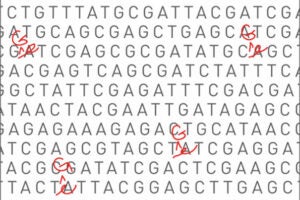
-
Nation & World
How to defend against your own mind
Harvard psychology chair Mahzarin Banaji is working with a research fellow to launch a new project called “Outsmarting Human Minds.”

-
Nation & World
Welcome renewal at Winthrop
After more than a year of renovations at Winthrop House, returning students have discovered a residence that combines neo-Georgian character with 21st-century amenities.
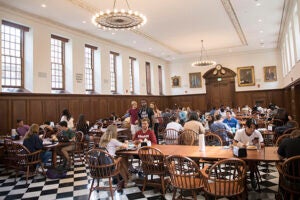
-
Nation & World
Making eight legs look like six
Using high-speed cameras, Harvard researchers have shown that ant-mimicking jumping spiders don’t walk on six legs in an attempt to appear more ant-like, but instead walk with all eight and take tiny, 100-millisecond pauses to lift their front legs to make them resemble ant antennae.
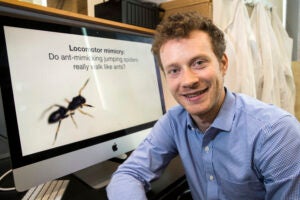
-
Nation & World
Making sense of survival
A Harvard study suggests a process known as synergistic epistasis enables humans to survive with an unusually high mutation rate.
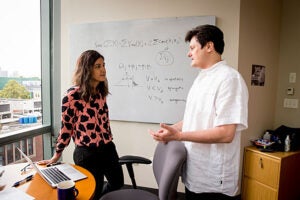
-
Nation & World
Voting-roll vulnerability
Online attackers may be able to purchase enough personal information to alter voter registration information in as many as 35 states and the District of Columbia, a new study says.

-
Nation & World
Bad knees through the ages
A new Harvard study is the first to definitively show that the prevalence of knee osteoarthritis has dramatically increased in recent decades.
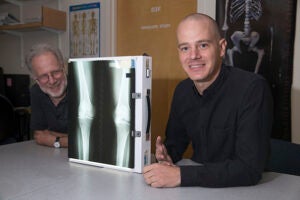
-
Nation & World
Gauging street change over time
Study uses computer vision algorithm to study Google Street View images to show urban shifts.

-
Nation & World
When brains overvalue immediate rewards
Study finds psychopaths aren’t inhuman, but have a particular kind of brain wiring dysfunction.
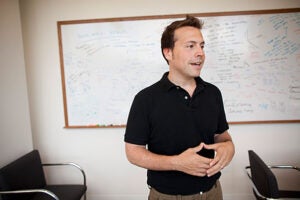
-
Nation & World
New insight on height, arthritis
New findings point to a surprising link between a genetic variant that favors shortness and an increased risk of osteoarthritis.
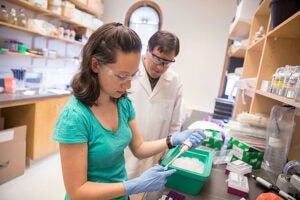
-
Nation & World
Whole brain imaging
New research led by Professor Jeff Lichtman opens a path to deeper insight on brain action behind certain behaviors.
